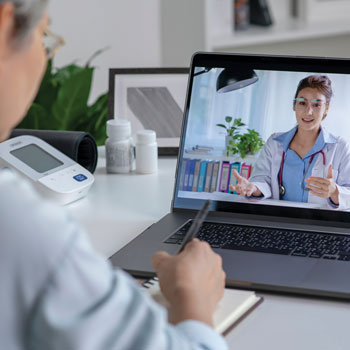Turning an interview into an offer
Preparing and practicing for an interview go a long way in helping to land that next job.
“Tell me about yourself.”
That popular prompt of job interviewers everywhere can elicit a sense of excitement or dread in candidates, with responses often setting the tone for the conversation that follows.

But the good news is, “since you know that question is coming, it gives you the perfect opportunity to prepare for it beforehand, practice it, and edit it, and then you can tell your narrative in a very concise way,” said Erica Grabscheid, MD, FACP. Dr. Grabscheid is a professor of medicine at Icahn School of Medicine at Mount Sinai in New York City and cowrote an article on asking the right questions in an interview that was published by the Journal of Hospital Medicine in February 2024.
Preparing and practicing for an interview go a long way in building applicants' confidence and signaling to employers that they're taking the conversation seriously, experts said. In discussions with I.M. Matters, they shared their top interviewing tips for early career physicians and offered some wisdom on mastering the process.
Getting organized
The first step in maintaining control during what can be a months-long job search is to create a spreadsheet, Dr. Grabscheid recommended. It can contain everything from job descriptions and titles to dates of application, confirmation of receipt, and current interview status. “People usually apply for multiple jobs at the same time, and it's very quick to happen that you lose track of information,” she explained.
Once an interview is confirmed, applicants should start doing background research on the company—and themselves. Not only should you be familiar with the organization's personnel, goals, and mission, you should be just as comfortable discussing your own story and career path.
“Create a list of your long-term goals, your skills and attributes, and why you are best qualified and interested in this position,” said Stephanie Tyner, director of residency outreach for Community Health Systems in Gulf Shores, Ala. Candidates should be acutely familiar with their CV and confident in everything that's on there, she continued. “Confidence comes from preparing for the interview process and the potential questions. Be confident in who you are and your knowledge, training, and experience, and convey that in your answers and when discussing your background.”
When reviewing your CV, be sure to also identify stories from your experiences that help exemplify strengths you want to highlight, suggested Megan Hiles, MD, FACP, a physician at National Jewish Health in Denver and a member of ACP's Council of Early Career Physicians (CECP).
One such strength could be your growth mindset, noted Amy Holbrook, MD, FACP, associate program director of internal medicine residency at Abbott Northwestern Hospital in Minneapolis.
“It's not a time to be modest,” said Dr. Holbrook, who is the current Chair of the CECP. “Your job is to sell yourself, and no one else is going to be doing that for you.”
Ms. Tyner agreed. “You have worked hard to obtain your degree as a physician and to be where you are in your career, so don't sell yourself short. Don't be afraid to be confident, not cocky, but confident in your skills as a physician, and to express that.”
It's important to realize that interviewers already know the specifics of your experience from your CV and that the main point of the discussion is to assess interpersonal skills, said Dr. Grabscheid.
“Surprisingly, a lot of times, there's a disconnect between how polished somebody seems on their resume and then how a person is in real life,” she explained. Interviewers will be on the lookout for whether you're well spoken, provide thoughtful responses, and are a good listener. “Because … I hope this is going to turn into a reflection of how a doctor will behave at the bedside with a patient, or even how this person will behave in a meeting one day with senior leadership,” she said.
One way to demonstrate these traits is to show interest in the role, something that can be achieved by preparing questions for the interviewer ahead of time.
“Employers are always very appreciative when a candidate has taken the time to think about what their questions are. … That shows that they're serious about assessing that fit,” Dr. Hiles said.
Candidates can tailor their questions based on whom they're speaking with that day. For example, questions about salary and benefits are best suited to a human resources representative, whereas a physician will be able to discuss a typical day's workflow. It might also take multiple interviews with different team members to get all your questions answered, experts added.
“How many patients a day? What are the expected hours? What are the on-call hours? How will you support me in my practice?” are all potential points to bring up, according to Ms. Tyner. “These questions can vary, but I think it's very important for physicians to understand the expectations of the employer. … The worst thing you can do is get into a situation and it's not what you thought it was going to be, and then no one's happy on either side of the table,” she said.
Remember, you're assessing the organization as much as it's assessing you, experts stressed. Take time to look for signs of a healthy workplace culture and collegiality among team members.
“You're really in the driver's seat more than you think,” Dr. Holbrook said. “An interview should really be a bi-directional conversation where they're learning about you, but you're learning about them.”
Practice and preparation
As with any skill, the more you practice interviewing, the better you'll become. That's why Dr. Hiles recommends candidates apply for jobs that might not be their dream roles but provide an opportunity to build experience. “If you interview for some jobs that may not feel as high stakes, then you will probably feel more prepared when you get to the one that's really important to you,” she said.
Another tip is to brainstorm questions you expect to be asked during an interview, and practice rehearsing answers with a spouse, friend, or colleague.
This also allows you to prepare responses that answer the question but don't devolve into rambling. This way, you can learn to stop once you've answered the question and avoid talking just to fill up space.
It helps to be an active listener, too. “The risk of overpreparing answers sometimes is that you lock into this script that you've made in your head and you're not actually answering the question in front of you,” Dr. Holbrook cautioned.
If an interviewer asks a two-part question, be sure to answer both parts. And, like preparing questions, candidates can tailor answers based on whom they're speaking with.
“You should be mentally prepared that you're probably going to be interviewed by many people that day,” said Dr. Grabscheid. “It'll probably be somebody from the group, then maybe the medical director, and then maybe, if you're lucky, somebody from administration or senior leadership.”
There's no doubt that what's said during an interview can make or break a hiring decision, but appearances and body language are just as crucial.
“Interviewers can usually tell if you're really anxious or nervous,” said Dr. Hiles. Maintaining eye contact, limiting fidgeting, and being mindful of facial expressions are all key. She also suggests wearing comfortable clothes to avoid constant adjustment.
The main rule of thumb is to mimic the body language on the other side of the table or camera, said Ms. Tyner. “If you answer with short answers or you have body language that shows that you're really standoffish and you're really not vested or interested, it's going to show.”
If it's a phone interview, be cognizant of tone and try standing up to keep the energy flowing. For video calls, make sure the background is free from distractions, the setting is quiet, and the internet connection is stable. If you prepare for technology glitches ahead of time, they'll be less likely to throw you off when they do happen. Silencing any phone or email alerts is always a good idea, although if you are a doctor on call, be sure to explain that at the outset, experts noted.
Arriving at the location or logging on to the video call early also gives you time to settle into the environment and compose yourself. If you're feeling particularly nervous that day, try to do things you normally do to relieve stress, like exercising or getting a good night's sleep, said Dr. Hiles.
Postinterview etiquette
At the end of every interview, candidates should thank their interviewer and clarify next steps in the hiring process, including asking when they should expect to hear from the company.
Sending a follow-up email within 24 to 48 hours is appropriate, as is asking whether you can provide any more information at this time, the experts said. This establishes a pathway for communication going forward and is a particularly important step for positions you're enthusiastic about.
If the interviewer says they'll get back to you in a specific timeframe with a decision or next steps and then don't, “it's very reasonable and appropriate to then follow up, and you want to do that in a polite and respectful way,” Dr. Hiles noted.
“Once you're farther along in the process, I want to highlight not being afraid to negotiate, especially for folks where it's their first job and they're just so excited to be getting a doctor paycheck,” Dr. Holbrook said. “One mistake I see early career physicians make is not negotiating their first contract.”
(I.M. Ready in the November/December 2023 I.M. Matters features more on best practices for contract negotiations, and readers can access additional career advice on ACP's Career Connection website.)
Overall, interviewers are ultimately looking for authenticity and enthusiasm. “Just be yourself,” said Dr. Grabscheid. “Being honest and straightforward and saying where you're coming from and what your needs are, and just making sure that it's really, truly, at the end of the day a match for the company, is the way everybody wins.”




